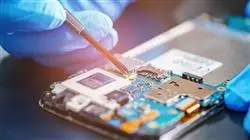University certificate
The world's largest faculty of information technology”
Introduction to the Program
Become an expert in Master's Degree and be able to solve those problems in the field of Engineering that enable the development of successful industrial processes”

Electronics are part of daily life for societies, since they are present in basic aspects, such as turning on a television or putting on a washing machine, but also in morerelevant issues such as the creation of medical devices that favor the rise in life expectancy. For this reason, there are many computer scientists who decide to specialize in this field, contributing all their knowledge to continue advancing in a field that is totally relevant to society.
Learn how to apply Electronic Systems in the field of energy efficiency and sustainability, and minimize environmental impacts”
This Master's Degree in Electronic Systems Engineering contains the most complete and up-to-date program on the market. The most important features include:
- Practical cases presented by experts in IT
- The graphic, schematic, and practical contents with which they are created, provide scientific and practical information on the disciplines that are essential for professional development
- Practical exercises where self-assessment can be used to improve learning
- Special emphasis on innovative methodologies in Electronic Systems Engineering
- Theoretical lessons, questions to the expert, debate forums on controversial topics, and individual reflection assignments
- Content that is accessible from any fixed or portable device with an Internet connection
The multitude of case studies offered by TECH in this Master's Degree will be very useful for effective learning in this field”
The teaching staff includes professionals from the IT sector, who contribute their experience to this program, as well as renowned specialists from leading societies and prestigious universities.
The multimedia content, developed with the latest educational technology, will provide the professional with situated and contextual learning, i.e., a simulated environment that will provide an immersive training experience designed to train for real-life situations.
This program is designed around Problem-Based Learning, whereby the student must try to solve the different professional practice situations that arise throughout the program. This will be done with the help of an innovative system of interactive videos made by renowned experts.
Knowing the features of Electronic Systems Engineering will be a key element for your professional growth"

By enrolling in this Master's Degree, you will have unlimited access to all the theoretical and practical resources"
Why study at TECH?
TECH is the world’s largest online university. With an impressive catalog of more than 14,000 university programs available in 11 languages, it is positioned as a leader in employability, with a 99% job placement rate. In addition, it relies on an enormous faculty of more than 6,000 professors of the highest international renown.

Study at the world's largest online university and guarantee your professional success. The future starts at TECH”
The world’s best online university according to FORBES
The prestigious Forbes magazine, specialized in business and finance, has highlighted TECH as “the world's best online university” This is what they have recently stated in an article in their digital edition in which they echo the success story of this institution, “thanks to the academic offer it provides, the selection of its teaching staff, and an innovative learning method aimed at educating the professionals of the future”
A revolutionary study method, a cutting-edge faculty and a practical focus: the key to TECH's success.
The most complete study plans on the university scene
TECH offers the most complete study plans on the university scene, with syllabuses that cover fundamental concepts and, at the same time, the main scientific advances in their specific scientific areas. In addition, these programs are continuously being updated to guarantee students the academic vanguard and the most in-demand professional skills. In this way, the university's qualifications provide its graduates with a significant advantage to propel their careers to success.
TECH offers the most comprehensive and intensive study plans on the current university scene.
A world-class teaching staff
TECH's teaching staff is made up of more than 6,000 professors with the highest international recognition. Professors, researchers and top executives of multinational companies, including Isaiah Covington, performance coach of the Boston Celtics; Magda Romanska, principal investigator at Harvard MetaLAB; Ignacio Wistumba, chairman of the department of translational molecular pathology at MD Anderson Cancer Center; and D.W. Pine, creative director of TIME magazine, among others.
Internationally renowned experts, specialized in different branches of Health, Technology, Communication and Business, form part of the TECH faculty.
A unique learning method
TECH is the first university to use Relearning in all its programs. It is the best online learning methodology, accredited with international teaching quality certifications, provided by prestigious educational agencies. In addition, this disruptive educational model is complemented with the “Case Method”, thereby setting up a unique online teaching strategy. Innovative teaching resources are also implemented, including detailed videos, infographics and interactive summaries.
TECH combines Relearning and the Case Method in all its university programs to guarantee excellent theoretical and practical learning, studying whenever and wherever you want.
The world's largest online university
TECH is the world’s largest online university. We are the largest educational institution, with the best and widest online educational catalog, one hundred percent online and covering the vast majority of areas of knowledge. We offer a large selection of our own degrees and accredited online undergraduate and postgraduate degrees. In total, more than 14,000 university degrees, in eleven different languages, make us the largest educational largest in the world.
TECH has the world's most extensive catalog of academic and official programs, available in more than 11 languages.
Google Premier Partner
The American technology giant has awarded TECH the Google Google Premier Partner badge. This award, which is only available to 3% of the world's companies, highlights the efficient, flexible and tailored experience that this university provides to students. The recognition as a Google Premier Partner not only accredits the maximum rigor, performance and investment in TECH's digital infrastructures, but also places this university as one of the world's leading technology companies.
Google has positioned TECH in the top 3% of the world's most important technology companies by awarding it its Google Premier Partner badge.
The official online university of the NBA
TECH is the official online university of the NBA. Thanks to our agreement with the biggest league in basketball, we offer our students exclusive university programs, as well as a wide variety of educational resources focused on the business of the league and other areas of the sports industry. Each program is made up of a uniquely designed syllabus and features exceptional guest hosts: professionals with a distinguished sports background who will offer their expertise on the most relevant topics.
TECH has been selected by the NBA, the world's top basketball league, as its official online university.
The top-rated university by its students
Students have positioned TECH as the world's top-rated university on the main review websites, with a highest rating of 4.9 out of 5, obtained from more than 1,000 reviews. These results consolidate TECH as the benchmark university institution at an international level, reflecting the excellence and positive impact of its educational model.” reflecting the excellence and positive impact of its educational model.”
TECH is the world’s top-rated university by its students.
Leaders in employability
TECH has managed to become the leading university in employability. 99% of its students obtain jobs in the academic field they have studied, within one year of completing any of the university's programs. A similar number achieve immediate career enhancement. All this thanks to a study methodology that bases its effectiveness on the acquisition of practical skills, which are absolutely necessary for professional development.
99% of TECH graduates find a job within a year of completing their studies.
Master's Degree in Electronics Systems Engineering
If you are an engineer looking for a specialization focused on technological innovation and electronic systems, the Master’s Degree in Electronic Systems Engineering is the perfect choice for you. This program offers the opportunity to deepen your knowledge and development of advanced technologies in electronic systems. The Master’s Degree in Electronic Systems Engineering at TECH Global University is designed for engineers seeking to develop skills in implementing sophisticated electronic systems. Students will learn to design integrated circuits, control systems, embedded systems, and related technologies. Additionally, the Master’s Degree focuses on the application of information technology in various engineering areas.
Electronics and its importance in everyday life
In this sense, the Master’s Degree in Electronic Systems Engineering at TECH addresses key issues that are fundamental in everyday life, both personally and professionally. The program develops specialized knowledge in the design of electronic systems and microelectronics, with a special emphasis on instrumentation and sensors that enable control, for example, detecting the presence of a person in a room. The Master’s Degree in Electronic Systems Engineering equips students with the necessary skills to lead the next generation of developments in electronic systems and information technology. If you are interested in becoming a Postgraduate Diploma holder in this field, the program will help you develop technical and practical skills to navigate the challenges of the technological sector. Don’t wait any longer to apply and take the first step toward a promising career in electronic systems engineering!







